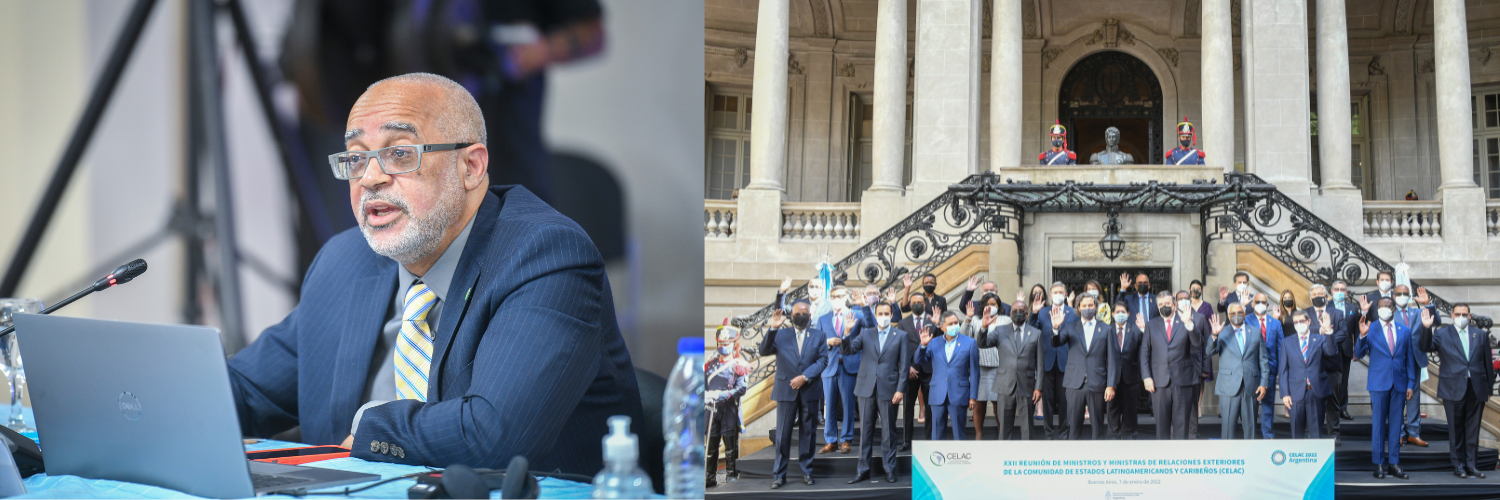OECS Represented at the 22nd Meeting of Foreign Ministers of CELAC
OECS Media Release
The Organisation of Eastern Caribbean States (OECS) Director General, Dr. Didacus Jules attended the XXII Meeting of Foreign Ministers of the Community of Latin American and Caribbean States (CELAC) on Friday January 7th 2022 in Buenos Aires, Argentina.
Among the main items on the agenda were the presentation of the achievements of the outgoing Pro Tempore Presidency held by Mexico during the period 2020-2021, and the transfer of the Presidency to Argentina.
In his address to the meeting, Dr. Jules began by expressing appreciation for the assistance provided to the OECS region by members of the CELAC body in the region’s fight against the COVID-19 pandemic.
''We are also duty bound to express our deepest appreciation to our sister states of the hemisphere who have demonstrated their solidarity with us in this difficult period and in particular to the Govts of Cuba, Mexico, Argentina and Brazil for their unfailing and material support with pandemic supplies to the OECS. Our solidarity with CELAC Members States in the respect for their national sovereignty remains unshakeable and non-negotiable.''
Dr. Jules highlighted the necessity, at a political level, to agree on a rationalization and more effective coordination of the regional infrastructure to allow CELAC to be more focused and effective.
''Notwithstanding the range of integration projects, for us in the OECS, CELAC is the best hemispheric vehicle for establishing this convergence. From the perspective of the small states of the Caribbean a rationalized infrastructure with clear definition of strategic intent and the leveraging of comparative advantage will make regional integration processes work seamlessly. The OECS as a dynamic regional integration project among the smallest states of the Caribbean is appreciative of the effort by CELAC to provide a more structured voice for the Caribbean in the CELAC family and the agreements reached in areas such as our presence in the Quartet and the participation of St Vincent & the Grenadines in the Disaster Response Mechanism. Our focus must be on the delivery of the concrete and material benefits to the public street – the citizens of our hemisphere must see, feel and experience the value of this integration.''
The OECS Director General expressed the OECS’ full support and commitment to the 15-point agenda proposed by Argentina, and within these proposals, highlighted those of greatest urgency to the OECS. These included:
- Post-COVID Inclusive Economic Reconstruction
- The Healthcare Strategy
- Comprehensive Disaster Risk Management
- Education Transformation
- Environmental Action and Climate Change
- Food Security
- Enhanced Regional Connectivity
- Digital Transformation
Foreign Ministers from Antigua and Barbuda, Grenada, Saint Lucia and St Vincent and the Grenadines were also present at the Meeting.
Note to Editors
The Community of Latin American and Caribbean States (CELAC) was launched in 2011, and functions as a regional mechanism for political dialogue and cooperation. It includes Thirty Three (33) permanent members in Latin America and the Caribbean. CELAC has helped deepen dialogue among countries of the region in areas such as social development, education, agriculture, finance, energy and the environment.
.png)









